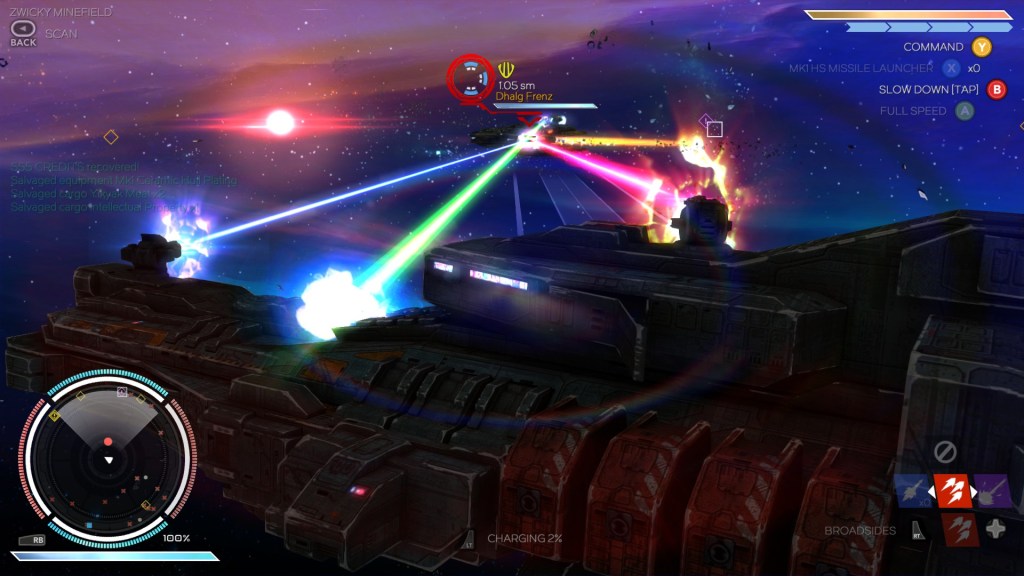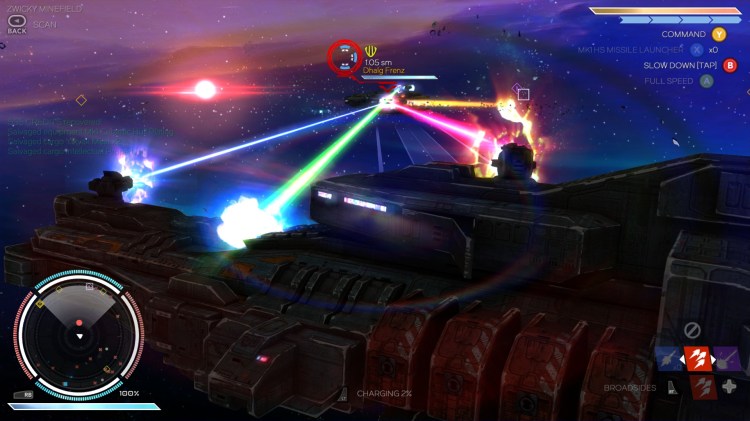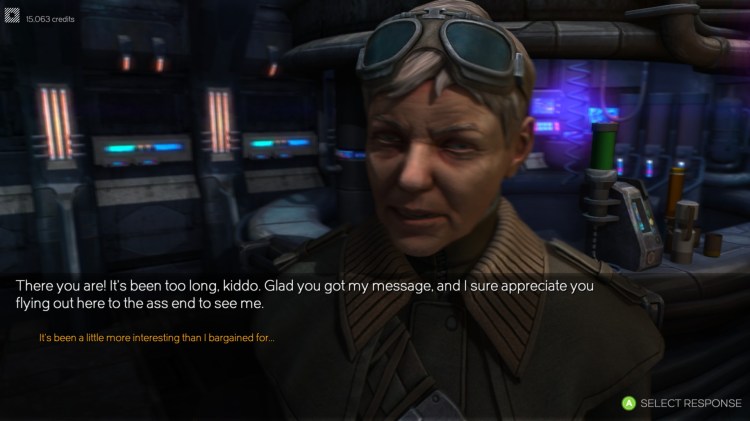Platforms: PC (Xbox One and PS4 coming later)
Reviewed On: PC
Release Date: October 20th
Developer: Double Damage Games
Publisher: Double Damage Games
Singleplayer: Yes
Multiplayer: No
You may have noticed me slip a good few mentions of how much I love Firefly into various posts, the sci-fi western from Joss Whedon that never even got to complete its first season before Fox cancelled it, a move that so many people have never forgiven them for. There’s currently a Firefly MMO in development, but otherwise there’s never been an official Firefly game. Rebel Galaxy, though, comes close, evoking memories of the show through its stellar music while forging its own path through space, mixing together a great combat system with compelling gameplay. It’s repetitive, but ultimately an engaging and fun adventure.
Unusually for a game about piloting ships across the universe Rebel Galaxy takes place entirely on a single plane, so there’s no pitching up or down, you can only turn right or left while the enemies small fighters and bombers are capable of moving in all three dimensions. The reason for this is that combat system is actually based upon old-school naval warfare, favoring full-on broadside attacks reinforced with turrets on the ship that can be manually controlled or set to automatically handle enemies. It actually feels a lot like Assassin’s Creed: Black Flag’s excellent naval combat in the sense that you hold down the left trigger ( a controller is recommended for the game) to aim your broadside which is more accurate the longer you hold down the trigger. Obviously there’s no waves in space, so combat typically takes within fields of debris or amidst huge asteroids, so you’ve always got the chance to grab some cover while shields recharge, or if you aren’t paying attention you’ll just crash straight into things.
And it works wonderfully well. Enemies come in many shapes and sizes from small bombers and fighters that can harass you and even run rings around your ship if you’re flying something big and cumbersome, to larger things like torpedo boats, frigates and even terrifying dreadnoughts that can unload destruction and death. On the player’s end there’s a range of broadside weapons and turrets available so you can customise how you approach a situation. Perhaps you favor long-range weapons that can be used to pick off foes, or maybe you want something heavy hitting that’s built for close-combat work, supported by heavy armor and shields. Or you want speed, keeping the ship small and light so you can get in, hit hard and get back out. Some weapons are good at piercing shields, others at dealing with small craft and some are best suited for hitting the hulls of big capital ships. Combat itself has a good feel as you have to watch out for being swarmed, which is easily done, and constantly ensure that you’re maneuvering so that the enemy can’t get a part of your shields down and access the more vulnerable hull. Getting into a heated battle against a swarm of fighters and a selection of bigger ships really is a whole lot of fun.
That’s not to say there aren’t some small flaws with it. If you manage to wipe out fighters and bombers hurtling around then battles against the remaining big ships can turn into a case of exchanging shots until somebody’s shields finally give up and real damage can be done, which isn’t exactly exciting. Likewise against a strong ship you may find yourself at a prolonged ranged battle if your weapons are capable of hitting from a greater distance than that of the enemy. Both of these things, though, are par for the course when dealing with massive capital ships.
The driving force behind everything you do is the acquisition of new ships and new gear for them. You begin with a small ship that has just a few broadside ports and turrets, a crappy hull and very little space for cargo, but eventually you’ll save up some cash and buy new weapons, better armor, faster engines and shields that can soak up even more damage. Save some more pennies in a piggy bank and you’ll be controlling a whole new ship, advancing to light frigates or opting for something that can really handle huge amounts of cargo. Eventually you’ll be flying destroyers, or may even own one of the game’s huge dreadnought class beasts that can’t fly very fast but can have 20-broadside ports, a load of turrets and enough armor to simply sit there and take the punishment while the smaller turret weapons demolish incoming fighters like the little knats they are. Getting your hands on a more powerful ship and better weapons and defenses creates a palpable sense of progression, a reason to keep tackling missions and blowing up bad guys.
New gear needs cash, though. Outside of the main story missions every single one of the many stations scattered throughout the universe offer randomly generated side-missions to undertake, tasking you with hurtling through the void to a location and usually blowing some enemy ships up, or blowing some enemy ships up and grabbing something. Get used to doing that because that’s pretty much what the story missions have you doing, too. Both the Merchants Guild and Mercenaries Guild can also be joined, each offering up their own sets of randomly generated missions that will increase your standing with them, which in turn unlocks Guild specific gear and ships. Naturally this equates to better cargo ships from the Merchants Guild as well as large cargo hold upgrades, and more combat capable beasts from the Mercs Guild. Outside of them all the factions in the game actually have reputation levels that are constantly fluctuating depending on the missions you’re doing or how you act in certain situations. Some missions will gain favor with the militia, others with more nefarious forces. Other methods of cash are hunting down bounties, stopping at certain distress beacons or just trading goods. There’s a basic economy running behind the scenes that dictates the value of the many different kinds of cargo, and thus it’s possible to earn my by buying goods cheap and selling them somewhere else. Or you could sell whatever cargo you come across when wrecking enemy ships, including contraband which can get you in a bit of trouble with the law, although if you’ve got a solid reputation with them they’re happy enough to just let you keep flying provided you hand over the illegal goods, albeit with a small penalty to your reputation with them that can be combated by doing a mission or two for them. By paying attention to what barmen tell you at stations and the news you can quickly judge what place needs what goods and thus earn maximum profit. You can even exploit the convoys that travel the galaxy by beating them to their destination and selling the very same type of cargo they were delivering. You can artificially create demand by destroying incoming convoys of ships, before then selling the station the stolen loot. Yes, piracy is a valid way of playing the game, as there are always plenty of outposts willing to trade in illegal goods. Just watch out for the law. You can even go mining for valuable minerals to sell, too, making a living exploring asteroid belts.
Becoming a merchant king can be a bit problematic, though, as prices shift every day and there’s no way of telling what time it actually is. You might fly across the system to sell some cargo at a station desperately needing it, only to find the prices have shifted mid-transit. The truth is if you want to actually complete the main story missions you’ll need to become a fighter, because while mining and trading can earn some money it’s nothing compared to the side-missions which are practically entirely based upon combat.
While it’s very possible that the developer’s have never watched or even heard of Joss Whedon’s show it does feel like Firefly was a big inspiration at times, the twang of a guitar eerily mirroring the series music and, just for a minute, making me feel like Captain Mal flying through the Verse’ looking for another job to keep me, my crew and my ship flying. It’s got a Western style atmosphere, portraying space as a rough and tumble frontier full of shady characters, people looking to make life miserable, and a lot of folk just trying to get by, either by legal or illegal means. Aiding this is a stellar soundtrack which uses the likes of Blues Saraceno, The Blue News and Nick Nolan’s Hell on Wheels. It’s a brilliant mix of thumping blues rock that suits the game wonderfully well. The bad news is that it isn’t an extensive soundtrack, so songs repeat themselves a lot, especially given how much time you’ll spend just flying around. To combat this the game has an option for players to bring in their own custom soundtrack. Regardless the atmosphere is brilliant, helping me to get lose for hours at a time.
The rest of the sound design is pretty solid, too, with the developers opting to forgo the lack of sound in space so that battles are more interesting. It would have been nice if the weapons, especially the more powerful ones, packed more of a vicious sound. Otherwise, though, everything sounds pretty damn good. The same can’t be said of the voice acting which is quite lackluster at times. Graphically it’s fairly strong as well. Drop by a station and look at the barman or something and it looks kind of crappy, but once you’re out in space, which is where you spend about 99% of your time, there’s plenty of beautiful views. The explosions look iffy up close, but in the midst of combat the flash of laser, blast of broadsides and piles of missiles being exchanged between huge ships enhances the excitement of combat. It never manages the spectacular combat sequences of something like the Battlestar Galactica TV show, but there’s something glorious about dropping out of warp, parking your dreadnought in the middle of a bunch of enemies and just unleashing hell. It’s space, so eventually everything begins to look the same, but for a small-scale development team Rebel Galaxy manages to impress with its graphics.
Tying it all together rather loosely is the game’s plot. It begins with your aunt asking you to race across the galaxy post-haste, so you grab her old ship and do exactly that, eventually becoming embroiled in a tale involving an alien relic with amnesia which needs to piece together its hold memories, which just so happen to be scattered around the universe. It’s basic stuff with equally basic characters and so-so writing, but it’s just enough to keep the game ticking along. Still, if you really need a good plot to become properly invested a game it’ll be best to simply avoid this one.
There are a couple of minor problems here and there, such as how warp speed will suddenly slow down for no appearent reason, or how friendly A.I. ships don’t always seem to be aware of your physical presence, resulting in a crash. There were a few instances of the game not dropping me out of warp when approaching an object like it should, and sometimes the range at which the game forces you out of warp when getting near objects is a bit annoying, as is how long you’ll sometimes have to wait before being able to return to warp.
Rebel Galaxy’s biggest problem, though, which you’ve probably already worked out for yourself, is one of repetition. Every mission is practically the same thing with little variation, and much of your time is spent warping across the universe in search of a new mission in order to buy new upgrades to tackle bigger, badder missions. Travelling can often be a long process, especially when you run into an asteroid field and have to drop out of warp while you boost through it, or encounter a group of enemies and try to simply fly around them rather than become embroiled in yet another fight. However, games like Diablo and of course the Torchlight series, of which the developers of Rebel Galaxy used to work on, are built on this repetitive foundation and somehow thrive on it, the drive for better gear constantly pushing the player forward despite the fact that in most other games such repetition would be a massive problem. Rebel Galaxy successfully weaves the same spell as these dungeon crawlers, keeping you playing despite the relative monotony of what you’re doing. Seriously, I’m finding it hard to put down the controller.
Despite the fact that the entire game essentially boils down to flyin’ and fightin’ Rebel Galaxy is without a doubt one of my favorite games of the year. Make no mistake, I’m not saying it’s one of the best games of the year; that repetitive structure will put a lot of people off and the combat isn’t exactly deep, but it has clicked with me and I can see it potentially making my list of top games of 2015. Once it grabs hold of you it doesn’t let go, demanding that you keep flying through the Verse’, grabbing more gear and new missions. It’s the Torchlight of space, and while it doesn’t offer the same level of complexity as other space sims on the market it brings to the table its own charms.










